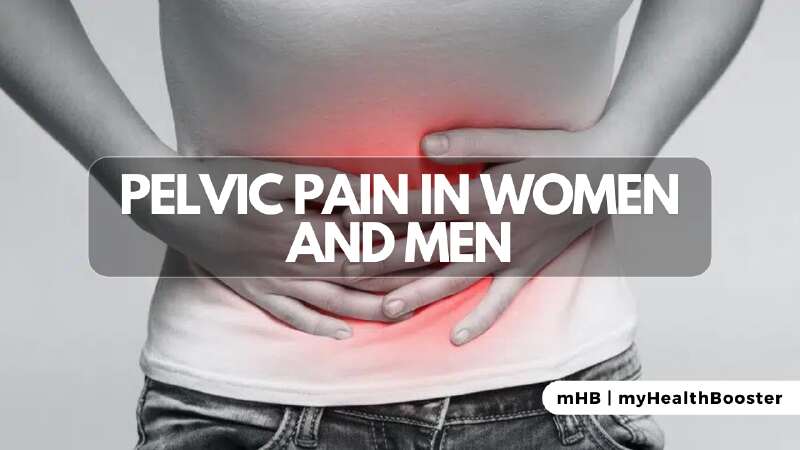Pelvic pain, characterized by discomfort in the lower abdomen below the umbilicus, affects both men and women. This article explores the various causes of pelvic pain, its associated symptoms, diagnosis, treatment, and prognosis.
Pelvic Anatomy
The pelvis comprises the hip bones supporting the spine, housing a cavity within. Understanding pelvic anatomy is crucial to identifying potential sources of pain.

Causes of Pelvic Pain in Women
- Menstrual Issues: Dysmenorrhea, or menstrual pain, varies in intensity and can disrupt daily activities.
- Ovarian Cysts: Large, ruptured, or twisted cysts may cause pelvic pain.
- Fibroid Tumors: Although usually symptomless, large fibroids may lead to pelvic discomfort or heavy menstrual bleeding.
- Pelvic Inflammatory Disease (PID): Caused by infections, PID results in widespread inflammation in the reproductive organs.
- Endometriosis and Adenomyosis: Conditions involving abnormal tissue growth outside the uterus can cause severe menstrual cramps and pelvic pain.
- Ovulation: Mittelschmerz refers to pelvic pain during ovulation.
- Pelvic Congestion Syndrome: A buildup of blood in pelvic veins can lead to pain.
- Vulvar Pain: Accompanied by burning or stinging sensations, vulvar pain may occur during intercourse.
- Cancers: Although rare, cervical, uterine, or ovarian cancers can cause pelvic pain.
Pelvic Pain during Pregnancy
- Ectopic Pregnancy: Implantation outside the uterus, often in the Fallopian tube, can result in life-threatening bleeding.
- Miscarriage: Pain and vaginal bleeding are common symptoms of early pregnancy loss.
- Preterm Labor and Placental Abruption: Pelvic pain, backache, and vaginal bleeding may signal preterm labor or placental separation.
Causes of Pelvic Pain in Men
- Chronic Prostatitis (CP/CPPS): Poorly understood, this condition causes persistent pelvic pain.
- Acute or Chronic Prostatitis: Inflammation of the prostate, often due to bacterial infection, can lead to pelvic pain.
Other Common Causes of Pelvic Pain in Both Genders
- Appendicitis: Acute inflammation of the appendix can cause abdominal or pelvic pain.
- Urinary Issues: Kidney stones, kidney infection, and urinary tract infections may lead to pelvic pain.
- Digestive Tract Problems: Inflammatory bowel diseases, irritable bowel syndrome, and hernias can contribute to pelvic discomfort.
- Pelvic Floor Muscle Spasms: Conditions like levator ani syndrome can cause chronic rectal pain.
- Anal Fissure: A painful tear in the anus lining.
Associated Symptoms
Depending on the cause, pelvic pain may be accompanied by abdominal tenderness, fever, nausea, vomiting, changes in bowel habits, or urinary symptoms.
When to Seek Medical Attention
Prompt medical care is essential for unexplained or new pelvic pain, especially during pregnancy, if associated with bleeding, or accompanied by troubling symptoms.
Diagnosis and Treatment
Healthcare professionals use physical exams, lab studies, and various diagnostic tests (ultrasound, CT, MRI, etc.) to identify the cause. Treatment depends on the underlying condition and may involve medications or surgery.
Prognosis
Prognosis varies; some causes, like uncomplicated UTIs, may have an excellent outlook, while chronic conditions such as prostatitis, endometriosis, or cancers may recur and become chronic.
Prevention
Prevention is linked to the specific cause of pelvic pain. For instance, safe sex practices can reduce the risk of sexually transmitted diseases, and maintaining hydration can help prevent certain kidney issues.
This overview aims to enhance understanding of pelvic pain, empowering individuals to recognize symptoms, seek timely medical attention, and navigate the diagnosis and treatment of this complex issue.
References
- Bhavsar, A. K., et al. “Common questions about the evaluation of acute pelvic pain.” Am Fam Physician. 2016 Jan 1;93(1):41-48A.
- Singh, MK, MD et al. Chronic pelvic pain in women. Medscape. Updated: Feb 28, 2018.
- Watson, R. A., MD. “Chronic pelvic pain in men.” Medscape. Updated: Jan 16, 2015.
